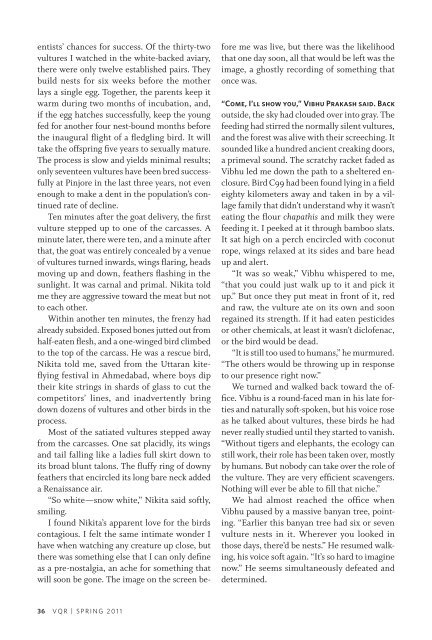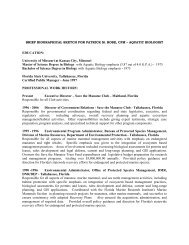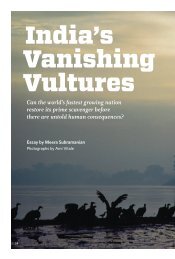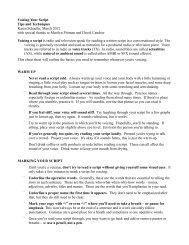You also want an ePaper? Increase the reach of your titles
YUMPU automatically turns print PDFs into web optimized ePapers that Google loves.
entists’ chances for success. Of the thirty-two<br />
vultures I watched in the white-backed aviary,<br />
there were only twelve established pairs. They<br />
build nests for six weeks before the mother<br />
lays a single egg. Together, the parents keep it<br />
warm during two months of incubation, and,<br />
if the egg hatches successfully, keep the young<br />
fed for another four nest-bound months before<br />
the inaugural flight of a fledgling bird. It will<br />
take the offspring five years to sexually mature.<br />
The process is slow and yields minimal results;<br />
only seventeen vultures have been bred successfully<br />
at Pinjore in the last three years, not even<br />
enough to make a dent in the population’s continued<br />
rate of decline.<br />
Ten minutes after the goat delivery, the first<br />
vulture stepped up to one of the carcasses. A<br />
minute later, there were ten, and a minute after<br />
that, the goat was entirely concealed by a venue<br />
of vultures turned inwards, wings flaring, heads<br />
moving up and down, feathers flashing in the<br />
sunlight. It was carnal and primal. Nikita told<br />
me they are aggressive toward the meat but not<br />
to each other.<br />
Within another ten minutes, the frenzy had<br />
already subsided. Exposed bones jutted out from<br />
half-eaten flesh, and a one-winged bird climbed<br />
to the top of the carcass. He was a rescue bird,<br />
Nikita told me, saved from the Uttaran kite-<br />
flying festival in Ahmedabad, where boys dip<br />
their kite strings in shards of glass to cut the<br />
competitors’ lines, and inadvertently bring<br />
down dozens of vultures and other birds in the<br />
process.<br />
Most of the satiated vultures stepped away<br />
from the carcasses. One sat placidly, its wings<br />
and tail falling like a ladies full skirt down to<br />
its broad blunt talons. The fluffy ring of downy<br />
feathers that encircled its long bare neck added<br />
a Renaissance air.<br />
“So white—snow white,” Nikita said softly,<br />
smiling.<br />
I found Nikita’s apparent love for the birds<br />
contagious. I felt the same intimate wonder I<br />
have when watching any creature up close, but<br />
there was something else that I can only define<br />
as a pre-nostalgia, an ache for something that<br />
will soon be gone. The image on the screen be-<br />
36 VQr | SPrIng 2011<br />
fore me was live, but there was the likelihood<br />
that one day soon, all that would be left was the<br />
image, a ghostly recording of something that<br />
once was.<br />
“Come, I’ll show you,” Vibhu Prakash said. Back<br />
outside, the sky had clouded over into gray. The<br />
feeding had stirred the normally silent vultures,<br />
and the forest was alive with their screeching. It<br />
sounded like a hundred ancient creaking doors,<br />
a primeval sound. The scratchy racket faded as<br />
Vibhu led me down the path to a sheltered enclosure.<br />
Bird C99 had been found lying in a field<br />
eighty kilometers away and taken in by a village<br />
family that didn’t understand why it wasn’t<br />
eating the flour chapathis and milk they were<br />
feeding it. I peeked at it through bamboo slats.<br />
It sat high on a perch encircled with coconut<br />
rope, wings relaxed at its sides and bare head<br />
up and alert.<br />
“It was so weak,” Vibhu whispered to me,<br />
“that you could just walk up to it and pick it<br />
up.” But once they put meat in front of it, red<br />
and raw, the vulture ate on its own and soon<br />
regained its strength. If it had eaten pesticides<br />
or other chemicals, at least it wasn’t diclofenac,<br />
or the bird would be dead.<br />
“It is still too used to humans,” he murmured.<br />
“The others would be throwing up in response<br />
to our presence right now.”<br />
We turned and walked back toward the office.<br />
Vibhu is a round-faced man in his late forties<br />
and naturally soft-spoken, but his voice rose<br />
as he talked about vultures, these birds he had<br />
never really studied until they started to vanish.<br />
“Without tigers and elephants, the ecology can<br />
still work, their role has been taken over, mostly<br />
by humans. But nobody can take over the role of<br />
the vulture. They are very efficient scavengers.<br />
Nothing will ever be able to fill that niche.”<br />
We had almost reached the office when<br />
Vibhu paused by a massive banyan tree, pointing.<br />
“Earlier this banyan tree had six or seven<br />
vulture nests in it. Wherever you looked in<br />
those days, there’d be nests.” He resumed walking,<br />
his voice soft again. “It’s so hard to imagine<br />
now.” He seems simultaneously defeated and<br />
determined.












